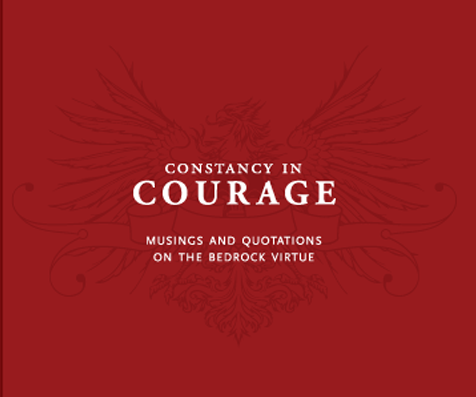
Author's Note: I don't include full names on my quotations, but you can find them with a quick Google search.
Few things reveal truths, definitions, and understanding on a subject as completely as a strong collection of quotations. A narrowed collection is like a good consommé. Although started with a large supply of ingredients, it has been simmered down to what is truly sought after. It is rich in flavor and adds much to the meal of our lives.
Many books of quotations are too broad. Trying to supply the writer or speaker with material on every subject, they barely delve into them. We get a taste of the topic, but not the deep flavor needed. We need concentration, not breadth.
Rather than attempting to supply the writer or speaker, the cataloger of quotations should attempt to supply the thinker. Writers and speakers are, after all, firstly thinkers (and if they are not, then the pen needs to be retired and the tongue given a rest until such is the case).
Most consumers of quotations use them on an occasional basis for enriching a speech or article. But this is like using the refrigerator for storing books. Yes, it can be done. But maybe that isn't maximizing its potential. Books of quotations can (and should) cause us to think and think deeply about a topic, from many angles. They provide a panoramic view of that topic that begins to construct a framework of understanding.
A good collection of quotes can be studied every day. Some or all can be committed to memory. When studying quotes on virtue (or any topic), keep in mind the following:
Viewpoints
Narrowly defined, deep collections of quotes examine a specific topic from many, many angles. This expands our previously constricted viewpoint into a broader one. Only through multiple viewpoints can we truly begin grasping a concept.
Quotations will tell the full measure of meaning, if you have enough of them.
—Murray
The viewpoint from a single quote might look like this:
The viewpoints from a good collection of quotes might look like this: 
Suddenly, we see things more fully. Our confining, one-sided perspective has become more expansive. We've heard some other opinions, probably some contrary to our original point of view. Contrary opinions are like competition in a free market society: They keep things honest.
All maxims have their antagonist maxims; proverbs should be sold in pairs, a single one being but a half-truth.
—Matthews
Consider the following quotes:
When fear seizes, change what you are doing. You are doing something wrong.
—George
Fear is a sign--usually a sign that I'm doing something right.
—Jong
Which of these quotes is true? Which is false? This is an example of how "antagonist" quotes can round out our understanding. Both quotes are true, of course--given the right situation.
Sources
It is easy to give credibility to those with whom we agree. But if the speaker disagrees with our political, religious or other views, oftentimes we quickly dismiss his or her words, or maybe we only half-listen. If we know nothing about the source of the words, we are more likely to judge the words strictly on their content.
Consider this quote:
Confusion, indecision, fear; these are my weapons.
Does our perception of these words change when we know their source is Adolf Hitler? Do they seem more important, relevant, interesting? Less so? Is Hitler someone from whom we want enlightenment? What important things can we learn from Hitler's words?
To learn from those whose opinions differ from our own is important. It doesn't mean our stance necessarily needs to change; often it doesn't. Rather, our current position is often strengthened by an opposing view. But other times, we might see areas where our views need to be broadened.
Consistencies
If two witnesses are testifying to an event, our credibility of that event grows. As the number of witnesses grows, so does the event's believability. The same occurs with the credibility we give to notions about virtue (or any other topic).
Examine the following quotes:
Men hate each other because they fear each other; they fear each other because they don't know each other; they don't know each other because they are separated.
—King
If we fear long enough, we hate. If we hate long enough, we fight.
—Gonzalez
What is the common theme in the two? We will find the theme of "fear leads to hate" in many quotations. As the number of sources grows, so does our belief that such is a true principle.
Relationships
With quotations dealing with virtues, look for ways that different virtues relate to each other. Almost all virtues do relate and some are key stepping stones to others.
Consider the following:
Courage is rightly esteemed the first of human qualities because it is the quality which guarantees all others.
—Churchill
The only wisdom we can hope to acquire is the wisdom of humility; humility is endless.
—Eliot
Honor is the throne of integrity.
—Spanish Proverb
The virtues are intertwined and interrelated. By noticing how they support, strengthen, and develop one another, we gain insight into each individual virtue.
Understanding
We might never fully understand a quotation. Certainly the idea of studying quotes is to understand them. But meanings we draw can often change as our pool of experience changes. Quotes that seemed shallow or meaningless previously can suddenly jump to insightful life as occurrences in our lives teach us more fully what the source meant. Time changes our perceptions, and a different perspective usually translates into new understanding.
Time
Understanding quotes takes time, as does almost anything of real value. And the more time dedicated, the more quickly the results will come, and the more powerful they will be. Quotes grow in value when studied again and again. A strong collection of quotations can be studied for decades and still yield fruit.
Over time, we become increasingly familiar with the quotes. We can memorize them if we wish, but if not, they still become part of our memory, our mind, and even our being.
Context
Context is an interesting concept, often useful, sometimes not. We commonly hear that a phrase was used "out of context," meaning that its surrounding, supporting elements have been left out, thereby changing or distorting the meaning. Many times it can be helpful or profitable to find the quotation in context to grasp more fully the intended meaning of the words and/or gain further insight into the subject. But quotations sometimes can take on a new life of their own outside their context.
Consider the following example:
Early in her life, a woman walked down the street and saw a piece of torn paper on the sidewalk. Picking it up to throw in the trash, she saw these words: "with hard work and persistence you can accomplish anything you wish."
The phrase struck a chord in her soul and she decided to make those words her focal point. As her life progressed, she continued to work hard and be persistent and racked up successes in almost everything she undertook. Toward the end of her life, she wondered who originally had spoken the words that had set the tone of her life and success.
She did a quick search and found that the man who spoke them was a pessimistic philosopher and, actually, there were a few more words to the statement. In context, it read: "Some fools believe that with hard work and persistence you can accomplish anything you wish."
She discovered the words came from an essay debunking the belief that hard work and persistence brought anything good. In context, the meaning of the statement was completely opposite to what she had thought.
From the above, it can be seen that context doesn't always matter as much as we think. Were the woman's successes any less real because she didn't understand the intended meaning of the quote?
Each time an editor takes a quote out of a longer body of text, he obviously is adjusting it contextually (because now there is lack of context). Each editor has line-item-veto authority, but usually attempts to preserve the original, intended meaning of the quotation (which, in itself is difficult, as, even in context, the quotation might be interpreted differently by separate parties). But failure to completely preserve the original intent doesn't necessarily mean the quotation can't have worth.
Quotations should be judged at least in part by the value they possess as individual units, not solely on their meaning in contextual situations.
Memorization
Memorization has many powerful fruits. Two of the most important are portability and availability. When we have memorized something, it is always with us wherever we are, and is always there to recite, even if just mentally.
Another reward of memorization is its ability to promote understanding through deeper scrutiny. As we repeat something again and again during the memorization process, deeper meanings are revealed. We see subtle nuances and previously invisible connotations. We start seeing the verse from many angles.
A fourth profit is a fuller planting of the verse in our mental processes. Our mind hears the verse over and over, creating greater likelihood that it will recognize where the verse is applicable during our day-to-day interactions. The principles of the verse are more likely to take hold in our hearts. We do become what we think about, and the memorization process focuses our thinking.
A final fruit is the instantaneous power a memorized verse can supply. Powerful words repeated with conviction and feeling can change the current situation. The words can change us internally or change someone else.
An example of these fruits might come from memorizing the following verse:
God planted fear in the soul as truly as he planted hope or courage. It is a kind of bell or gong which rings the mind to quick life and avoidance on the approach of danger. It is the soul's signal for rallying.
—Beecher
After the verse is memorized, we carry it everywhere we go (portability) and can recall it at any time (availability). While we are in the memorization process, and are constantly repeating it, we think about what it really is saying. We realize that fear isn't always such a bad thing, but rather, it can be a kind of alarm--a call to rally (finding deeper meaning).
After the memorization process, we are much more likely to view and react to fear differently--as an alarm--than we did before (planting principles in the heart). If, in the future, we feel fear coming on, we can repeat the verse with power and conviction--either verbally or in the mind--to help combat that fear (instantaneous power), or even repeat it verbally to someone else if they are fearful.
The Power of Quotations
Quotations studied daily yield daily profits. A proper collection will direct our thoughts to new heights, important heights. This study can be a springboard to a deeper perusal of the subject.
It is a good thing for an uneducated man to read books of quotations... The quotations when engraved upon the memory give you good thoughts. They also make you anxious to read the authors and look for more.
—Churchill
Educated people will profit as well. Their desire for the subject will increase, their education will be more robust, and dividends will be produced. Quotes, over time, become good friends that we can call on for reassurance, direction and guidance. We can introduce these friends unabashedly to others, for we know the kind of friends they are.



